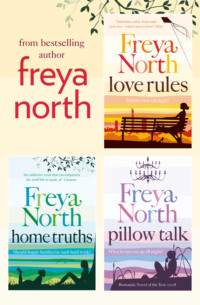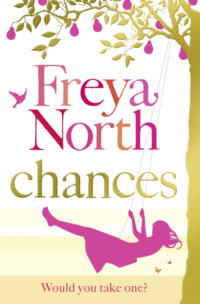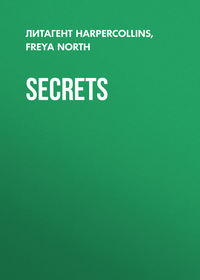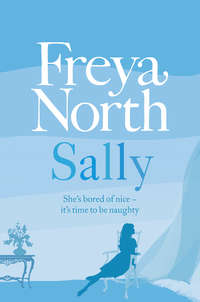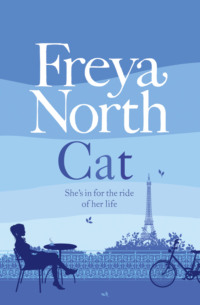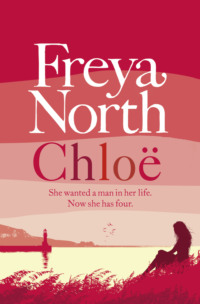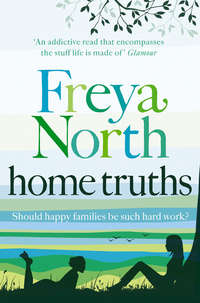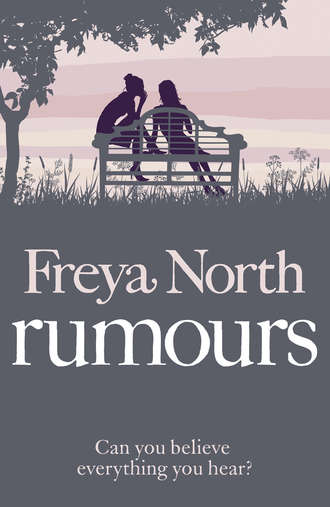
Полная версия
Rumours
Ten miles in sixty-eight minutes. Not bad. Not bad.
‘Xan?’
He wished Siobhan wouldn’t call him that. Laura used to call him Xan. And that experience had shown him how familiarity bred contempt. Also, with his mind now alert and his body charged by endorphins, he just wanted to shower, have a quick, quiet coffee with his bowl of muesli and be gone. Siobhan didn’t need to be here – not in his bed, not on the scene. He had to do something about it, he really did. Just not now.
‘Xan?’ she called out.
God!
‘I need a shower!’ he called back.
‘I need to go.’
Thank God!
‘OK.’
‘Call me.’
‘OK.’
Xander always marvelled at the transformation. All it took for his Lazy Git alter ego (the duvet-muffled bloke who’d had too much red wine the night before) to morph into Xander Fletcher with all traces of sleep, sex, stubble and sweat erased, bright and eager to greet the day, was a ten-mile run in under an hour and ten minutes. Dressed neatly in dark trousers and a pale shirt, driving sensibly through his beloved village of Long Dansbury to his office in Hertford twenty-five minutes away, he thought of the process as a sort of protracted Superman turnaround. Well, if not a super man, a good bloke at any rate. Heading for forty in a couple of years, Xander had no complaints at all. He lived in a lovely cottage, he had an OK bank balance and his own business keeping its head above water, a close family, great friends and a woman called Siobhan who didn’t mind things being casual. Doing those ten miles in sixty-three minutes would ice an already tasty cake. He thought about it as he headed out for his car. It was doable. Xander had been brought up to believe anything was doable. Apart from Love, which was beyond one’s control. Accordingly, he’d decided not to entertain it in his life, not since Laura.
He drove through a landscape which rolled and tumbled like a soft green rucked-up quilt. Born and bred here, Xander had never fallen out of love with his environs and never stopped noticing its beauty or the changes, for better or worse. That’s why, after interludes in Nottingham and London, he’d returned home at thirty.
His route took him through a handful of small villages, a few still with a shop clinging on for dear life to the local economy like a limpet to a storm-lashed rock. Most supported a pub and all of the villages heralded their approach with a profusion of daffodils along the verges in spring. Beyond each community, pastureland subtly cordoned off by barely visible electric fencing supported little gatherings of horses in weatherproof rugs, looking like the equine relatives of the Michelin Man. Woodland interrupted the swathes of fields like a patchy beard and the rivers Rib, Ash and Beane coursed through the landscape as if on a mission to deliver goodness straight to the Lea, the main artery of the area.
‘Good morning, Xander.’
Pauline Gregg, his PA of eight years, still wished he’d let her call him Mr Fletcher or Alexander at the very least. To her, it seemed too casual, unseemly somehow. When she’d been at secretarial school all those decades ago, she’d been trained, along with other girls, in the correct way to address their future employers and their clients. Formality is fitting; that’s what they learned. She felt it somehow downgraded her qualification to call her boss ‘Xander’. Her daughter, who was Xander’s age, told her it was a generational thing. But there again, her daughter had sent her children to a school where the pupils called their teachers by their Christian names. Moreover, the school didn’t classify it thus, but as ‘given names’. There again, that school appeared to be teaching Pauline’s grandchildren more about something called Diwali than Christmas. So many things to button one’s lip against – it was part of Pauline’s day to declare to herself at least once, what’s the world coming to?
‘Morning, Mrs Gregg,’ Xander said. He respected her right to be addressed like this – even though eight years on and being privy to the end of her marriage, the birth of her grandchildren and that Unfortunate Incident at the Roundabout With That Silly Car Which Wasn’t Her Fault, Xander considered Mrs Gregg to be on the outer ring of his family.
‘Seventy-two minutes?’ she ventured. Xander cocked his head and smiled. ‘Seventy?’
‘Sixty-eight,’ he said.
‘Very good, that,’ said Mrs Gregg. ‘Tea?’
‘Please.’ They sipped in amicable silence, each leafing through the documents on their desks. Xander looked up. ‘You’ve had your hair done.’
Mrs Gregg touched it self-consciously but smiled. ‘Yes.’
‘Very nice,’ said Xander. He wished his own mother would wear her hair in a similar style – elegant and in place – instead of the unruly thatch half in, half out of a bun, invariably adorned with debris from the garden. ‘Mrs Gregg, can you take this to the post office? And can you pick up a nice greetings card – blank inside?’
She glanced at him. When Xander had been steady with Laura for all those years, he’d never once asked her to help assist in the running of that relationship. He’d scoot off at lunch-time himself and return with flowers or something bulky in a bag which would sit quietly taunting her from the chair in the corner until he left in the evening. That was another part of her training going to waste – he had no need for her to alert him to Valentine’s Day, or Special Occasions. Yet today he was asking her to buy a card, blank, just like his expression.
‘Blank inside,’ she said, writing it down and, without looking up, she asked, ‘And what should be on the outside?’
‘Oh,’ he said, ‘something soft – floral perhaps. Or a landscape.’
She wrote it down. Floral. Landscape. Unlikely to be a special card for a ‘significant other’ – or however his generation referred to girlfriends these days. She felt strangely relieved and yet somehow disappointed for him too. He’s such a nice young man, she often described to her friends at bridge. It’s a bit of a waste, she’d say. Perhaps he’s not a lady’s man, one of her chums might venture. Oh, he’s not like that, Pauline would say, almost defensively. The contradiction had never confronted her – how she wanted to mother him, be at the helm of his life, yet keep the Decorum of Division she’d been trained to maintain.
‘Anything else?’
‘Treat yourself to a Danish pastry,’ said Xander.
‘Why, thank you!’
With Mrs Gregg gone, Xander leafed through his diary and in-tray. Design, print and packaging wasn’t a sexy business, but it was a solid one and even in the dire economic climate, Xander found his long-term clients remained loyal. He’d cut overheads instead of staff and it had been serendipitous that Keith, the designer, had asked to go part-time just when the office rent had been hiked, so Xander and Mrs Gregg moved to these smaller premises in the same building. Everything remained the same. Apart from the chair that had been in the corner of the old office, on which the flowers or the bag with the bulky object for Laura had once sat.
I don’t need that chair, Mrs Gregg, Xander had said. And that’s when Mrs Gregg realized Xander had broken it off with Laura – right at the point of engagement, she assumed. Though he said they could bring the chair with them, if she felt it might be useful, she’d declined. If he didn’t need it, who was she to suggest he might, at some point, in the future?
‘I bought this card – it has flowers and a landscape and is what I’d call gentle. I have paper napkins with this very design.’
‘Monet,’ said Xander.
‘No, no – it wasn’t pricey.’
‘Monet,’ Xander said again, as if he hadn’t heard her. ‘The Garden at Giverny.’
‘One of my favourites,’ Mrs Gregg said, as if there’d been no faux pas.
‘It’s most appropriate, thank you.’
Xander made a couple of calls and then, with the card open on his desk and his pen thoughtfully pursed between his lips, he gazed out of the window before beginning to write.
‘I’ll take the post,’ Mrs Gregg said at the end of the day.
‘There’s not much,’ said Xander.
‘It’s not a problem.’
‘I can post it on my way home.’
‘Let me,’ said Mrs Gregg. ‘You know those country lanes – if you get stuck behind something, you’ll be trundling along for hours and miss the post altogether. I’ll pop it in the box outside Elmfield Estates – it’s at the end of my street. It’s never collected before six. Never.’
‘OK,’ said Xander. ‘Thanks.’
She was barely out of the office door before she was leafing through the mail. Yes, yes, them, them, boring, boring. Ah! Aha!
Lady Lydia Fortescue
Longbridge Hall
Long Dansbury
Hertfordshire
Xander’s handwriting: even, bold and steady, written with his trademark calligraphy fountain pen. Mrs Gregg tutted at the envelope. Convene with women your own age, Xander, not an upper-class old battleaxe. Cut your ties with minor aristocracy! Venture forth into the real world – the one beyond Long Dansbury.
Chapter Three
Stella didn’t often go out, nor had she had her friends over that much recently. Her social life had dwindled over the last three years but this was her call because the invitations to socialize were no less forthcoming. Her close friends, her oldest friends – those she could count on the fingers of one hand who brought her all the dependable warmth and comfort of a well-fitting thermal glove – were always at the end of the phone, consistently energetic respondees to text messages and Facebook updates. Indirect contact and communication had become so easy that it was hard to remember when time was last spent together actually in person. She didn’t mind; she was always busy and, with the new job, tired too. It wasn’t as if she had much spare time to wonder how to fill it. But two weeks into her new position at Elmfield Estates, Stella had now settled into the routine. It was as if she’d been swamped by paperwork, floor plans and surveyors’ reports and had suddenly looked up and thought, where is everyone? So tonight, butternut squash soup simmered on the stove and a baguette was ready on the breadboard awaiting the arrival of Jo, the closest Stella had to a sister. Tomorrow, she’d invited herself over to her older brother Robbie’s and the day after that, their eldest brother Alistair would be hosting Sunday lunch for her on the condition she brought their mother and dessert. It did cross her mind that in one weekend she could conceivably regain the stone she’d lost over the last two years.
Jo arrived with a packet of tortilla chips, a jar of salsa, a great new haircut and, predictably, the suggestion of a date with some bloke who had a tenuous link to someone who knew someone who knew someone who knew Jo – and Stella had barely closed the front door.
‘Come on in, madwoman.’
‘You do realize I haven’t actually seen you since Pancake Day?’
Stella laughed. ‘Ah yes, when Stevie burnt herself on the pan, Scarlet spilled the sugar all over the floor and you referred to Michael as Tosser all evening?’
‘He was Chief Tosser – in charge of flipping the flipping pancakes,’ Jo justified. ‘And I told my daughters to keep away from the stove and let me do the sugar sprinkling.’
‘How are they all?’
‘Fine. Gorgeous.’ Jo kissed her friend three times: ‘There – their kisses are delivered.’
‘Thank you thank you thank you.’ Stella paused and raised an eyebrow. ‘I do have a bowl, you know. A veritable selection, in fact.’ But Jo had already opened the tortilla chips en route to the kitchen and updated Stella on her various nightmares at work through a mouthful of crumbs.
The salsa was pretty hot, the soup was delicious and butter oozed fragrantly into the warmed baguette but Jo and Stella barely tasted any of it, their hunger for conversation outweighing what was to eat. Stella regaled Jo with the details of Elmfield Estates and it provided ample opportunity for the merry chinking of glasses.
‘Any news from Charlie?’ said Jo. ‘Dare I ask?’
Stella chewed thoughtfully. ‘Not a word. Funny how, before it all happened, you always used to call him Chuck—’
Jo interrupted. ‘And when it was all kicking off, I called him Twatface.’ She paused. ‘I did wonder – even after all this time – with what’s happening now, whether he’d be in touch.’
Stella shrugged. ‘So did I. Yet the fact that he hasn’t, well –’
Jo nodded. ‘The lawyers – it’ll be any day now, I expect.’
‘I know,’ said Stella.
‘You’ll call me – won’t you?’ Jo stretched over the crumbs, the globs of salsa and splashes of soup which now decorated the table like a minor work by Jackson Pollock. She squeezed Stella’s arm. ‘Call it the last piece of the jigsaw – the final nail in the coffin. It’s a good thing.’
‘I’ll drink to that,’ Stella said, raising a glass and sipping so that she didn’t have to talk about it any more.
‘By the way,’ Jo said and, slowly, she let a lascivious smile spread, ‘your hair is looking a bit mumsy.’
‘Well, you look like a wee blonde elf,’ Stella said, in her defence.
‘That, my love, is intentional.’
‘But I wear it like – this – for work,’ Stella demonstrated, scooping it away from her face.
‘That’s highly appropriate for an estate agent,’ Jo said measuredly, ‘but a bit dull for a gorgeous, single, early-thirties gal.’
‘I’m mid-thirties, practically. So what is it you suggest I do?’
‘You phone Colin at Pop, that’s what you do. And tell him I sent you. And don’t tell him what you think you want – just put your head in his hands. Promise?’
‘Yes, Mum.’
‘How is your ma?’
‘I’m seeing her on Sunday, actually. At Alistair’s.’
‘And how’s the Robster?’ Stella’s brothers were as close as Jo came to having any.
‘I’m seeing him tomorrow, funnily enough.’
Jo was pleased. Stella, it seemed, was emerging from her self-imposed hibernation. At long last.
* * *
‘Mummy?’ Will called. ‘Mumma?’
Where was his rucksack? The medium-ish bluish one with the Clone Trooper design? Where had his mum put it? He looked in the usual places where she thought she tidied but really it was just moving his stuff to higher levels, to free up floor space. Well, it wasn’t in any of those places. Nor at the back of the cupboard. Nope, not under his bed either. Where was it? ‘Mummy!’ He really didn’t want to take the greenish, smallish rucksack because that had Ben 10 on and he so wasn’t into Ben 10 any more. ‘Mumm-y!’ He opened his bedroom door and stood at the top of the stairs, placed a cupped hand either side of his mouth and bellowed for her again.
There was a tap on his shoulder and Will jumped out of his skin. How did she do that? That teleporting thing? Suddenly appearing right behind him with precisely what he’d been looking for all along, and that Am-I-or-Am-I-Not-the-Best-Mum-in-the-World look on her face? She was, of course, the Best Mum Ever – and he’d bought her the birthday card with a badge that said so – but she still liked to pull that particular face all the time.
‘Why didn’t you answer me?’ Will said. ‘I was yelling and yelling. I thought you’d been taken by aliens or fallen down the loo or something.’
‘Thank you darling Mummy for my medium-ish bluish rucksack,’ said Stella.
‘Thanks, Mum.’
‘Mummy,’ said Stella.
‘Do I really have to be forty-five before I can just call you Mum?’
‘Absolutely. Now stuff in whatever it is you want to take to Uncle Alistair's and we’d better get going.’
Will went back into his bedroom and his mother went downstairs. ‘Remember the Stickies could choke on any small pieces of Lego,’ she called.
How did she know he was piling Lego into his bag? How did she know that? Will knew she had eyes in the back of her head – he’d known that from an early age. But how could she see through brick walls and closed doors? She said she’d tell him when he was ten – so just two years, six months and about a week of days and a zillion hours to go. He emptied out the Lego bricks and jumbled in some Bionicles pieces instead. His cousins – three-year-old Ruby and five-year-old Finn, commonly known as the Stickies on account of their constant general jamminess – were unlikely to eat Bionicles. Not once he’d explained their super powers and alarming weaponry. Anyway, his little cousins thought he was amazing in much the same way as he thought his older cousins, who he was seeing tomorrow, were incredible. And all his cousins called him Will-yum, sometimes just YumYum. Like he was delicious. And, as his mum told him he was precisely that, at least once a day, he sort of believed it too.
* * *
The Huttons were scattered over Hertfordshire; as if a handful of wild-flower seeds had been tossed from their mother’s front doorstep in Harpenden. Alistair lived with his family in a lovely 1930s semi in a good suburb of Watford just a stroll from Cassiobury Park. Robbie had settled with his tribe in St Albans, Stella had spent almost a decade just around the corner from Alistair and was now in Hertford and Sandie, their mother, still lived in the family home in Harpenden. Their father, Stuart, had a flat in Hemel Hempstead but seemed to spend most of his time with an odd woman called Magda at her bungalow near Potters Bar, though he resurfaced each Christmas and steadfastly made no mention of her. In terms of quality time, it was pretty much on a par with how much his offspring had spent with him when he’d been married to their mother. Whenever they referred to him, it was accompanied by a roll of the eyes and a quick tut – as if mention of him caused a minor tic. But it was indeed minor, Stuart having never played a major part in their lives.
The following day, Will could hardly wait for his grandma to get in the car and do her seat belt before he told her about Ruby putting the Bionicle piece up her nose yesterday, and sucking the bogeys off it before giving it an almighty chewing and denting it with her small teeth. He had to keep making the incident sound like an extraordinary happening where he’d somehow been both victim and hero, to deflect attention from the fact that everyone had said to him, Don’t Let Ruby Put Anything in Her Mouth. The grown-ups had given him responsibility. And though he’d failed, his expressive storytelling made it sound as though he’d saved Ruby and the Bionicle and he was fine about the fact that his toy was riddled with teeth marks.
His grandma was riveted. ‘Can you imagine if Ruby had swallowed it?’ She craned her neck to look aghast at Will in the back seat. ‘There’d be some poor Bionicle chap missing a vital part of his anatomy. Then how would the battles be won?’
‘Exactly,’ marvelled Will.
‘Exactly,’ Sandie concurred.
‘Mum!’ Stella protested.
‘Grandma, how old was Mummy before she could call you Mum?’
‘Twenty-eight and three-quarters,’ Sandie said, not missing a beat.
‘I have to be forty-five.’
‘That’s not very fair,’ said Sandie.
‘Twenty-seven, then,’ said Stella, glancing in the rear-view mirror at her son and giving him a wink.
‘Cool,’ said Will, looking out the car window.
Will assumed that, because of the family thing, he was genetically programmed to grow up and turn out like the Twins, teenagers Pauly and Tom, in much the same way as the Stickies would grow up to be just like him. And they’d all, one day in about a million years, turn into grown-ups like Alistair and Robbie. Apart, of course, from Sticky Ruby who’d turn out like her mum and Will’s mum and the Twins’ mum.
Much as Will felt his mother was the best, he secretly acknowledged that Aunty Juliet was the better cook, possibly the best cook in the world and, as he took his place between the Twins at the laden table he happily blocked out the boring chatter of the grown-ups, and the revolting mess of the Stickies sitting opposite him, to focus wholeheartedly on the spectacular offerings on his plate.
Stella sat by Juliet, whom she adored. Her brothers flanked their mother and Sara, Robbie’s wife, sat between her toddlers and managed in her inimitably competent way to feed herself and her children, yet be utterly present in the conversation. Stella looked around the table. It was like sitting in the best seats at the theatre waiting for the play to begin. With a surge of joy she thought this was to be her afternoon. It would linger into early evening and she was happy. She’d leave, hours later, replete in body and soul. Thank God for family. Thank God for hers. The decibel level was high yet not discordant and topics bounded between them all like the ball in a bagatelle. The tangents they veered off to, all part of the colourful ricochet of joyful banter.
‘It just goes back to what Gordon Brown said – but didn’t do,’ said Alistair.
‘That goes without saying,’ said Sandie, about something else entirely.
Sara chewed thoughtfully, picking up on an earlier thread. ‘I love the idea of supporting local businesses, shopping at the corner shop, buying books from a little independent bookshop. But when there’s Amazon and Ocado, and special offers which I can order online at silly o’clock, then it’s no contest.’
‘It was the debilitating flaw in New Labour,’ said Robbie to Alistair.
‘I think you’re probably right,’ said Sandie to any of them.
‘I have to agree,’ Juliet said, a little forlornly. She looked thoughtfully at a roast potato. ‘I bought these spuds from the farmers’ market. Ridiculously expensive, weighed a ton. I’m not entirely sure they taste any different from Waitrose. Oh, and Stella – I think I’ve found you a man.’
‘Whatsit’s brother?’ Alistair asked.
‘Miliband?’ said Robbie.
‘No – who Juliet’s talking about. For Stella.’
‘Oh! I forgot about him,’ said Juliet. ‘Two men, then,’ she told the table.
‘I have one for you too,’ said Sara.
‘Three,’ Robbie whistled.
‘Who’s who?’ asked Sandie.
‘The chap that takes Sing-a-Song,’ said Sara. ‘The Stickies love him. He’s so – smiley.’ She paused. ‘And he only wears the spotty trousers and silly hat when he’s working. I saw him strolling through the Maltings last week. Almost didn’t recognize him – really nice and normal. We had a little chat and I managed to deduce he’s not attached, not gay and likes dogs.’
‘I don’t have a dog,’ said Stella.
‘I know,’ said Sara, ‘but it’s a type, isn’t it – if he likes dogs he must have that caring side to his nature. Plus, of course, he’s great with kids.’
‘No, thanks,’ said Stella.
‘Talking of great with kids,’ Juliet said, ‘option number one is the brother of my friend Mel. He’s older—’
‘How old?’ Robbie interjected.
‘Fifty-odd,’ said Juliet.
‘I don’t like the “odd”,’ said Sandie.
‘I don’t like the fifty,’ said Robbie.
‘All right,’ said Juliet, ‘option number two is late thirties, never been married, split up with his girlfriend over a year ago. Has his own hair, his own teeth. He’s handsome, chatty, caring and he lives in Hadley Wood, apparently.’
‘He sounds promising,’ said Sara.
‘No, thanks,’ said Stella.
‘Hadley Wood is no longer a purely middle-aged enclave,’ said Alistair. ‘You should know that, Stella – from the property market.’
‘No, thanks,’ said Stella.
‘Who is he?’ asked Robbie.
‘My gynae,’ said Juliet.
‘No, thanks,’ said Stella.
‘Stella,’ Juliet said, ‘don’t be put off by his day job.’
‘The last thing I want to do after a day at the computer screen is to come home and log on,’ said Robbie darkly.
‘Don’t be awkward,’ said Sandie.
‘It’s not his job,’ said Stella.
‘What’s his name?’ asked Sara.
‘Bryanaston.’
‘What sort of a name is Bryanaston?’ asked Sandie.
‘That’s his surname,’ said Juliet. ‘His first name is Henry.’


